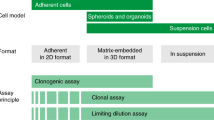Summary
Colony formation in soft agar was used to investigate growth properties and drug sensitivity in 102 tumor specimens from 91 patients. Sufficient colony growth for sensitivity testing with various drugs was obtained in 36 of 67 specimens (54%) with adequate cell yield and pathologically documented malignancy. Room temperature (20–24° C) is superior to both 4° C and 37° C for 12–36 h storage and transport of malignant effusions. By contrast, fine mincing in sterile saline or balanced salt solution, and refrigerated storage (4° C) appear optimal in experiments with three solid tumors. The use of buffered NH4Cl to lyse red blood cells markedly reduced plating efficiencies, and also reduced the percentage of tumors in which drug sensitivities could be tested from 64% to 38%. Several combinations of potential growth factors and culture media have been tested. Insulin enhanced plating efficiency (PE) in all six adenocarcinomas tested. Drug sensitivity of tumors was not affected by varying plating efficiency up to five-fold in two tumors. In eleven cases tumor cells were exposed to combinations of two or more drugs, and results assessed for evidence of drug interactions. In almost all cases, these two-drug combinations produced additive cell killing rather than either antagonistic or greater-than-additive effects.
Similar content being viewed by others
References
Laboisse CL, Augeron C, Potet F (1981) Growth and differentiation of human gastrointestinal adenocarcinoma stem cells in soft agarose. Cancer Res 41: 310–315
Moon TE (1980) Quantitative and statistical analysis of the association between in vitro and in vivo studies. In: Salmon SE (ed) Cloning of human tumor stem cells. Alan Liss, New York
Pavelic ZP, Slocum HK, Rustum YM, Creaven PJ, Karakousis C, Takita H (1980) Colony growth in soft agar of human melanoma, sarcoma, and lung carcinoma cells disaggregated by mechanical and enzymatic methods. Cancer Res 40: 2160–2164
Roos D, Loos JA (1970) Changes in the carbohydrate metabolism of mitogenically stimulated human peripheral lymphocytes. Biochim Biophys Acta 222: 505–582
Salmon SE, Buick RN (1979) Preparation of permanent slides of intact soft-agar colony cultures of hematopoietic and tumor stem cells. Cancer Res 39: 1133–1136
Salmon SE, Hamburger AW, Soehnlen B, Durie BGM, Alberts DS, Moon TE (1978) Quantitation of differential sensitivity of human-tumor stem cells to anticancer drugs. N Engl J Med 298: 1321–1327
Steel GG, Peckham MJ (1979) Exploitable mechanisms in combined radiotherapy-chemotherapy: the concept of additivity. Int J Radiat Oncol Biol Phys 5: 85–91
Von Hoff DD, Cowan J, Harris G, Reisdorf G (1981) Human tumor cloning: feasibility and clinical correlations. Cancer Chemother Pharmacol 6: 265–271
Author information
Authors and Affiliations
Rights and permissions
About this article
Cite this article
MacKintosh, F.R., Evans, T.L. & Sikic, B.I. Methodologic problems in clonogenic assays of spontaneous human tumors. Cancer Chemother. Pharmacol. 6, 205–210 (1981). https://doi.org/10.1007/BF00256972
Received:
Issue Date:
DOI: https://doi.org/10.1007/BF00256972




